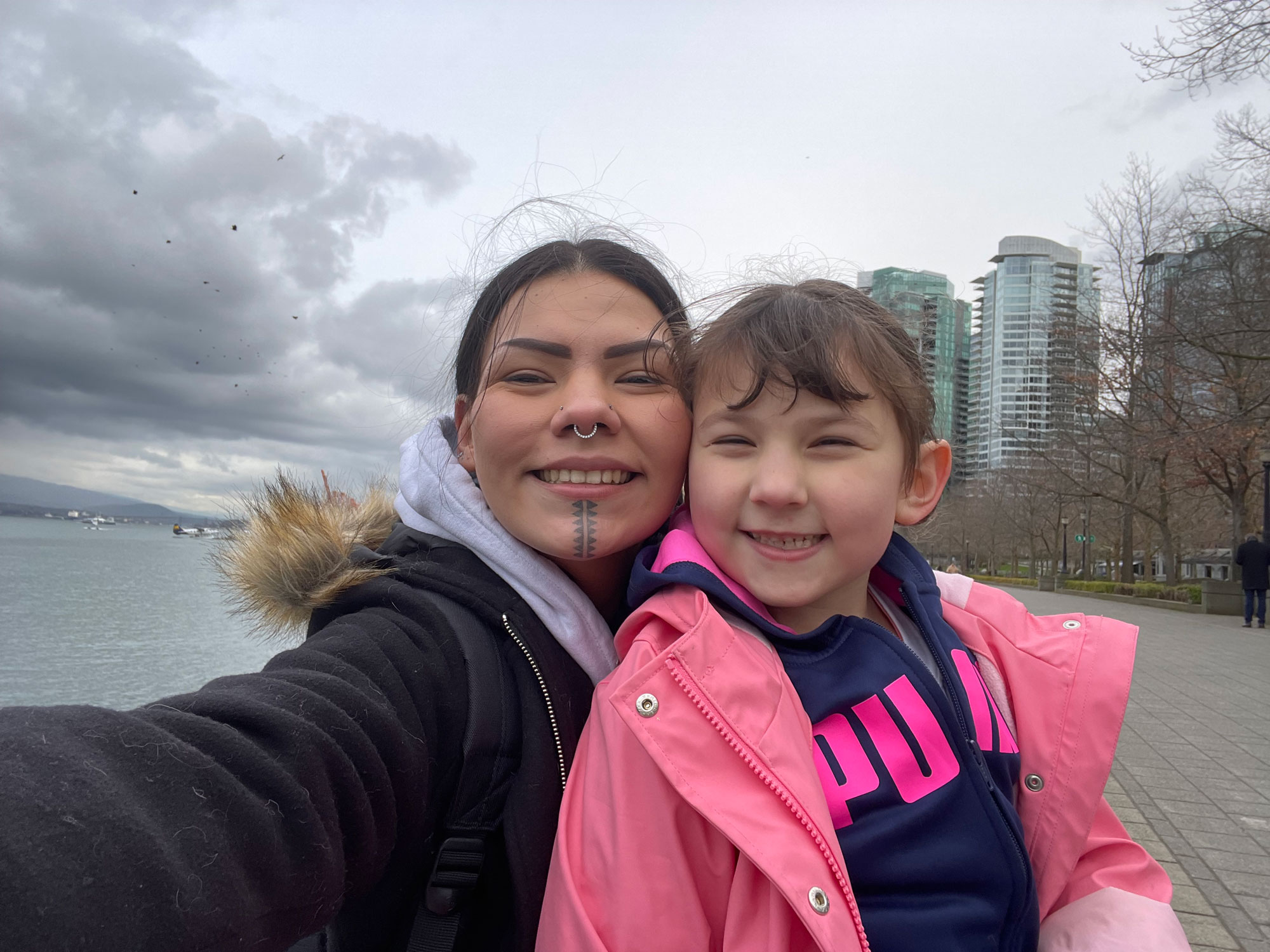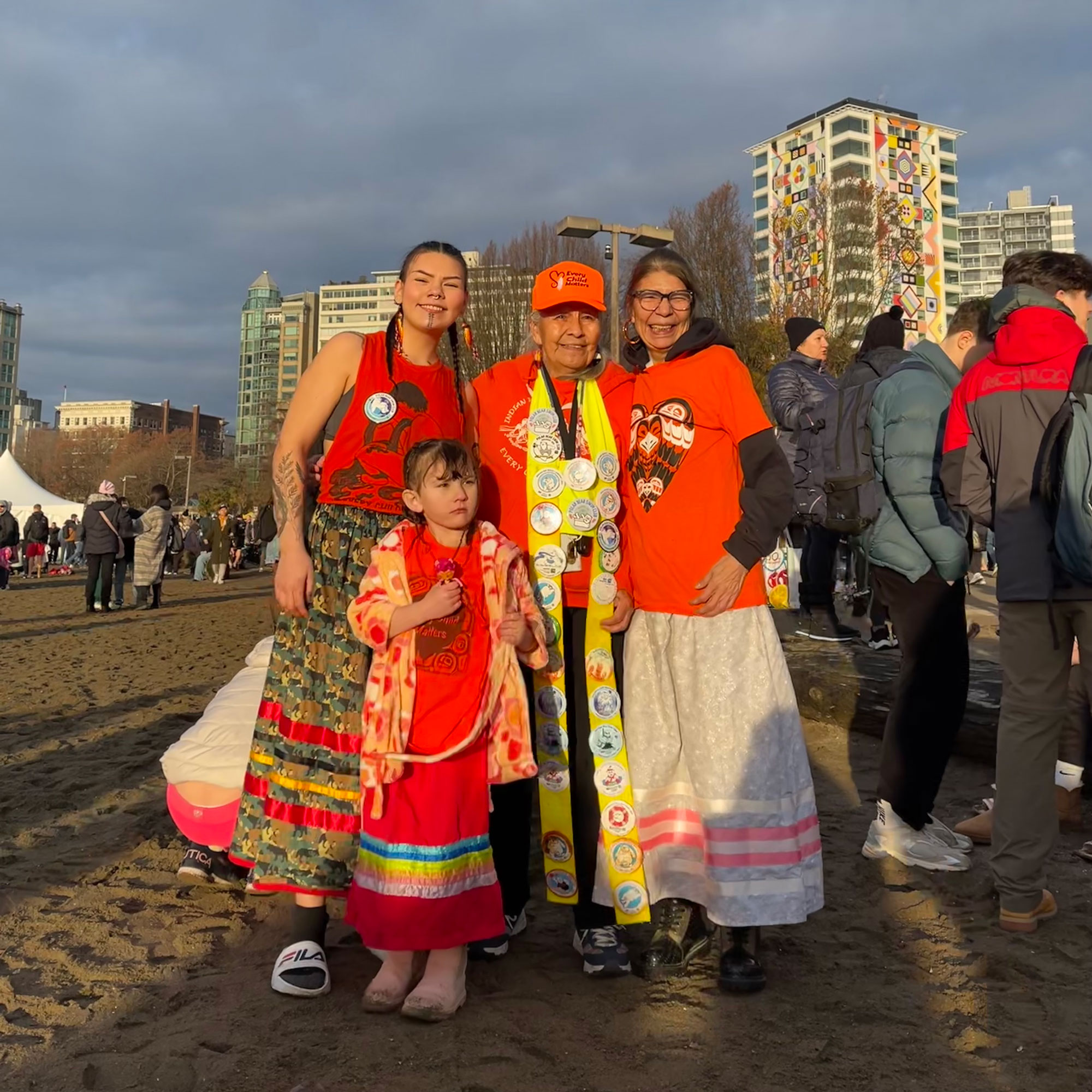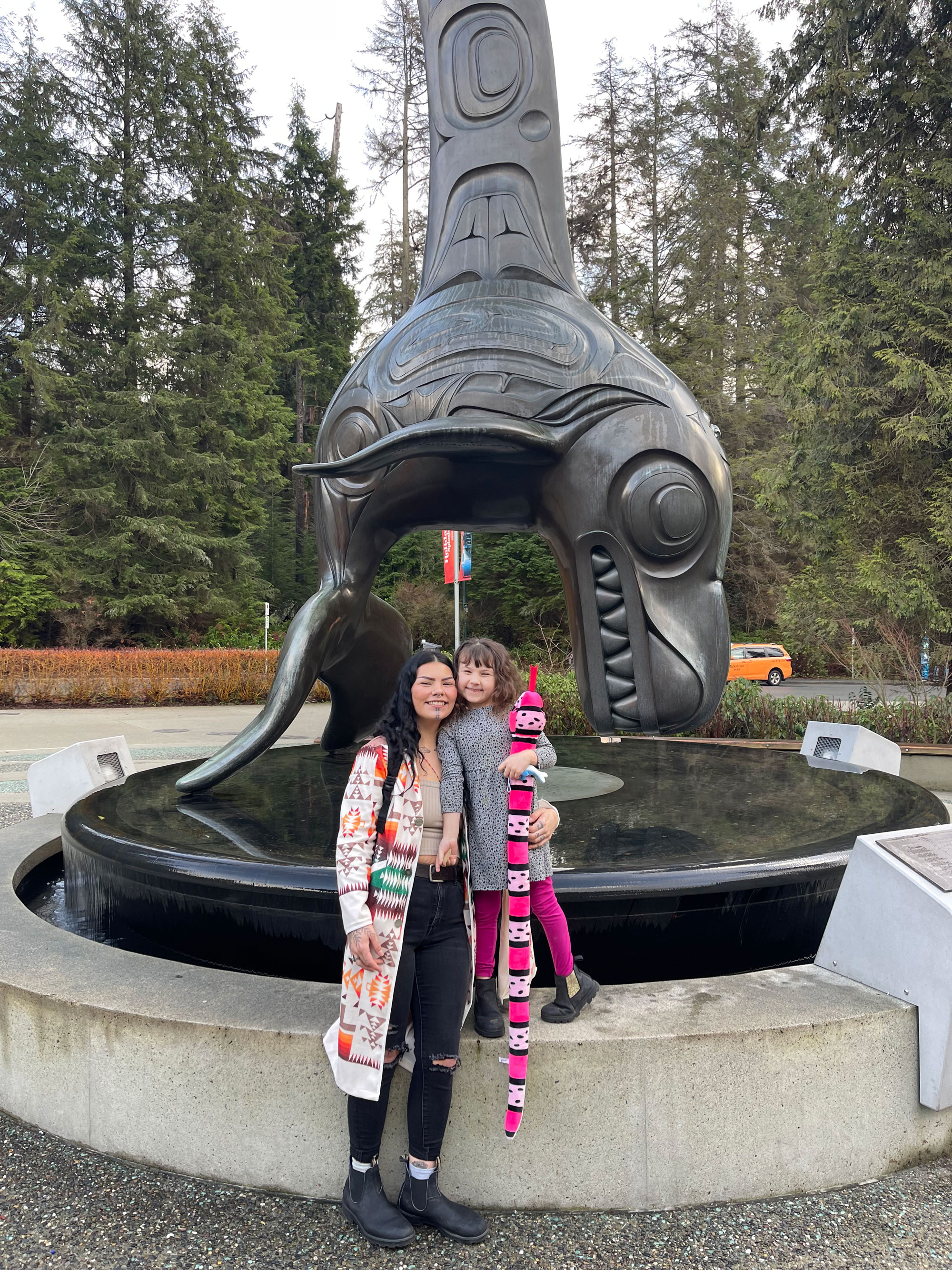Mother's Day will be celebrated in Canada on Sunday, May 11. It is a day meant to honour mothers and appreciate their role in society and their families. For this Mother's Day, the First Nations Health Authority invited Kaylee Wolflinger, 25, to speak about motherhood and the importance of filling and healing spirits.
Kaylee is a Two-Spirit Cree, Saulteaux, and Métis person who grew up urban Indigenous. Her mom is Indigenous, and her dad is mixed European.
In her early years, Kaylee was deeply connected to culture, especially through the powwow trail. Thanks to her mom's strength and dedication, she was introduced to community, ceremony, and dance from a young age. As Kaylee got older that connection started to fade. Addiction within her family made it harder to hold onto those parts of herself, and her passion to dance and be involved in cultural spaces dwindled.
Even so, those early teachings stayed with her. Reconnecting with her identity, culture, and community has been a powerful part of her journey—especially as she's come to understand herself as Two-Spirit. That identity and cultural grounding continue to shape and support Kaylee today.

Kaylee and Devin
“My reason for getting sober is my daughter. She is the future. The little ones are our future leaders."
There are two things that guide Kaylee in her approach to life: passion and helping others. She is passionate about her seven-year-old daughter, Devin – named in honour of a cousin who passed away from an accidental overdose when Kaylee was 14. Kaylee chose that name as she believes her cousin – whom she grew up with – protects and guides her daughter by lending his name.
Kaylee's family dynamics are complex, often influenced by her substance use and the stigma that comes with it. she says Kaylee is committed to doing the hard work of healing and changing, not only for herself but to ensure that she doesn't continue to hurt the people who care about her. With this understanding, she is determined to break the cycle of intergenerational trauma and become the person she needed when she was at her lowest.
“My mom used to tell me that my kokum wasn't taught love. She wasn't treated with care, so when she had children, she struggled to show that same love—she was navigating her own trauma, just like my mushum. And it was the same for my mom. Being in constant survival mode can take a toll on you. Now I see that as a mother myself. My kokum did her best with what she had survived. So did my mom. And so do I."
Kaylee has had ups and downs with substance use, but she's always kept fighting—for herself, her daughter, and her future.
“Even during my addiction, Devin always showed me unconditional love. She reminded me of who I am—and who I want to be. I've been honest with her about my substance use and the times I've slipped. And she tells me, “It's okay—you just have to keep going, keep trying." She is my reminder that I am loved and important. She reminds me why I'm doing this. For myself, my daughter, my family, my people and the future generations."
In her early life, Kaylee experienced homelessness and found stability just in time for her daughter's birth. She finished high school while caring for Devin, and even attended UBC on a scholarship. But as her responsibilities grew, so did her struggles. Addiction crept back into her life, fueled by the pressures of balancing motherhood, school, and personal loss. Despite the challenges, Kaylee always found ways to help others, motivated by her belief that when she helped, she healed.
Kaylee got involved with the Land Back movement joining an Indigenous Youth Land Defenders group called the Braided Warriors. They held protests against pipelines, but the police presence and trauma from encounters with law enforcement started to wear her down. Despite the challenges, Kaylee always found ways to help others, motivated by her belief that when she helped, she healed.
In the Vancouver's Downtown Eastside, Kaylee continued to help others, giving out food and supplies to those in need. She found that helping her community kept her from using substances. However, addiction would still grip her at times, and she lived in cycles of substance use, hospitalizations, and legal issues. Throughout this journey, Kaylee's daughter, Devin, was a steady source of love and support.
A significant turning point came after a life-threatening overdose and painful encounter with police. Kaylee knew she needed to turn things around. She reconnected with a friend she hadn't spoken to in years. Her friend listened to her and guided her toward healing. They went to a sweat lodge together, where Kaylee says she cried out more tears than she knew she had. There, the community welcomed her with open arms, offering support and understanding, and it was in these ceremonies that Kaylee began to reconnect with her culture and her purpose. Reconnecting back to culture and finding strength in ancestors are ways that First Nations people can reduce the harms of colonialism that they face each day. Kaylee illustrates how connection can be lifesaving and imperative to break unhealthy cycles that stem intergenerational trauma and disconnection.
Being part of ceremony allowed Kaylee to reconnect with a sense of identity, purpose, and belonging. It reminded her that healing is a right – not a reward.
“Some people say you shouldn't go to ceremony unless you are four days sober. But I believe those at their lowest deserve healing more than anyone – sweat lodges are meant to help us connect with Creator, with our ancestors, with ourselves. If someone comes with good intentions, they should be welcomed with compassion, not pushed away."
Over time, Kaylee has come to understand that her trauma is complex and layered. It isn't just about addiction—it's rooted in intergenerational trauma, family dynamics, police brutality, and the ongoing violence of colonial systems. She's faced discrimination and lateral violence, even from within the community, which at times made healing feel even more difficult. But instead of giving up, she's continued to seek out spaces of care. Alongside ceremony, Kaylee has reached out for professional support and is now accessing counselling to help her process and move through the pain.
Kaylee was diagnosed with ADHD, and prescribed medication has helped her eliminate some of the cravings for substances. She continues to navigate her trauma, determined to break toxic cycles. Her focus is on filling her spirit so she can heal herself and do right by Devin. She's now using the resources available to her, ensuring Devin has access to the supports she needs. Devin attends an Indigenous school that provides tutoring and one-on-one time, something Kaylee values deeply.

“My connection to community and culture goes hand in hand with my sobriety. It gives me the strength of my ancestors—those who fought to keep our culture alive through everything. I love my culture. I love my people. I love my family. But because of colonialism, residential schools, the Sixties Scoop, and ongoing racism, discrimination, and violence—we were robbed of teachings of love and care we should have grown up with. It's hard to reclaim what you were never taught.
As we heal from colonial violence which affected our minds, bodies, and spirits, each generation gets a little stronger when we heal and break cycles. We become a little more whole. We think seven generations ahead—I'm healing for my daughter, my great-great-great-grandchildren, for my people, my community, and my friends. We all influence one another. So maybe my healing, my story, my journey – can help someone.
This story reflects my healing journey as it has unfolded over time. Like many, I am still healing and learning, and my story continues."


